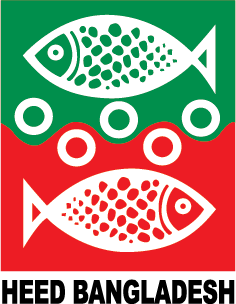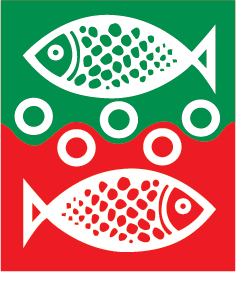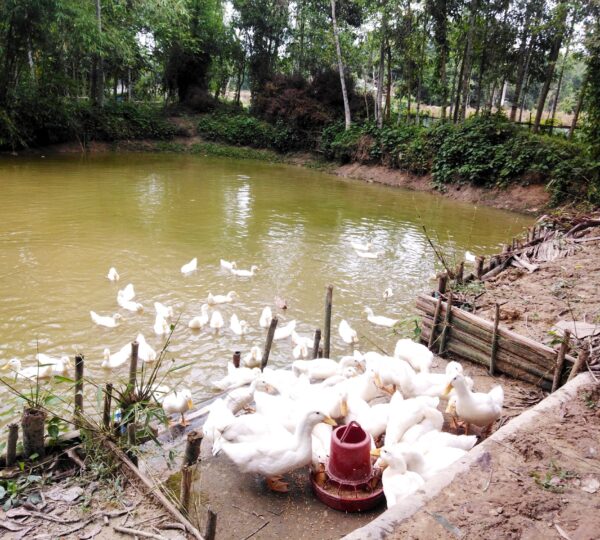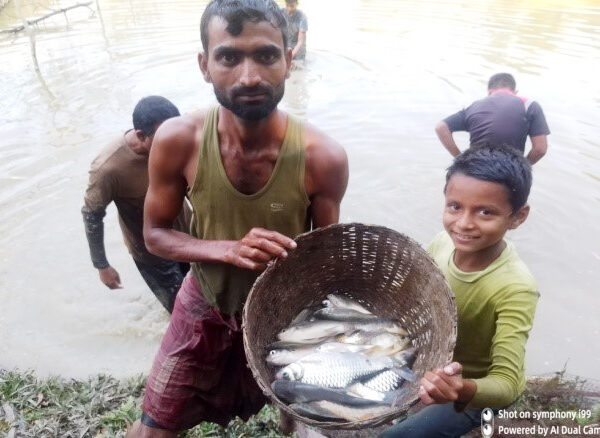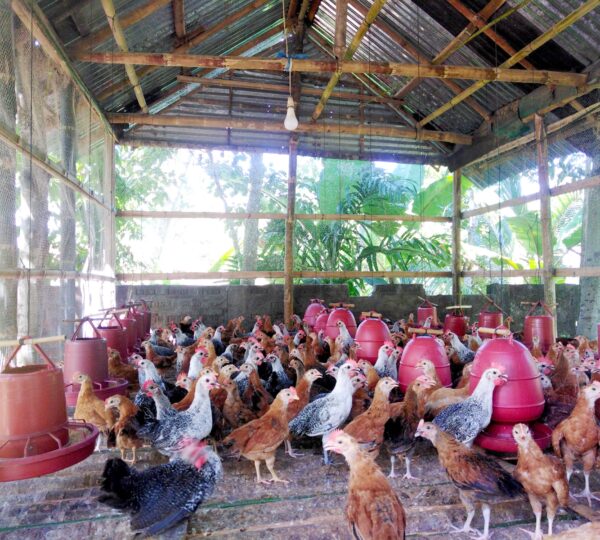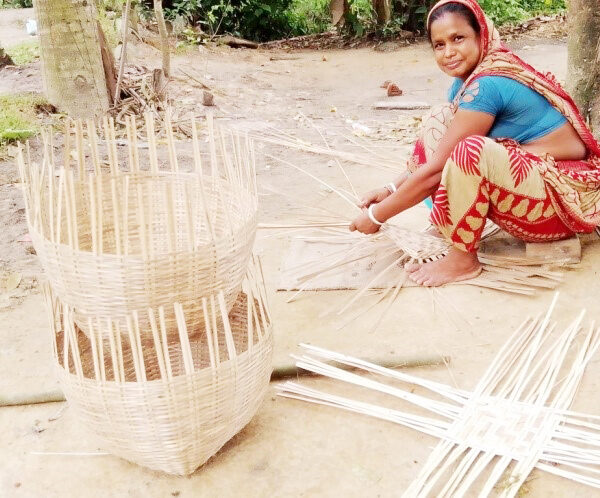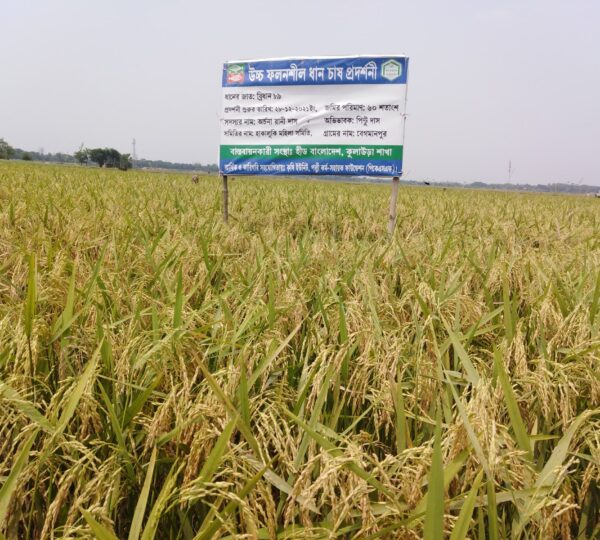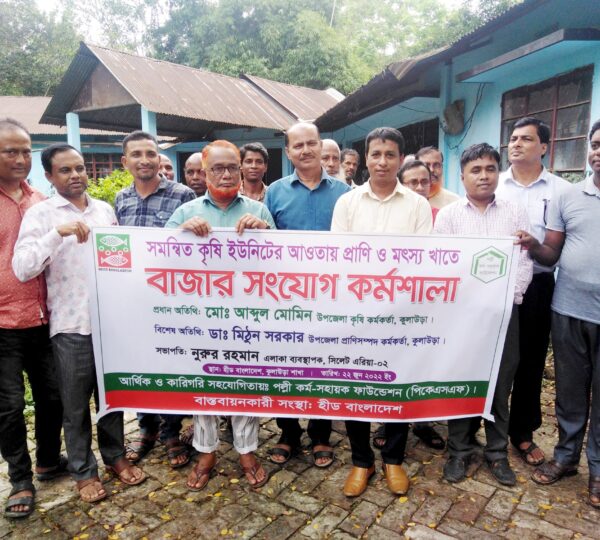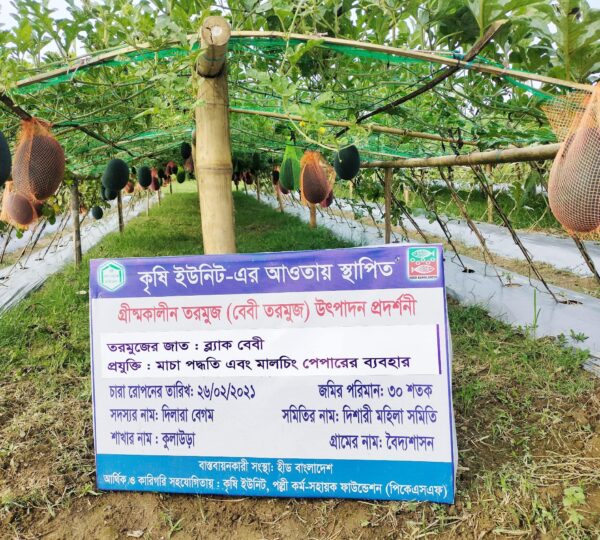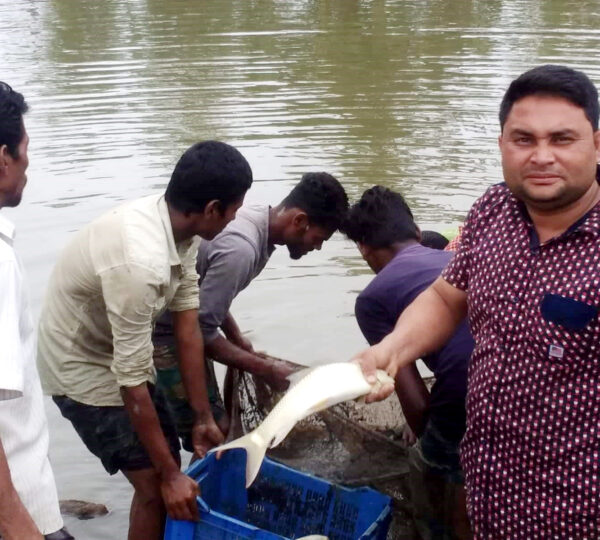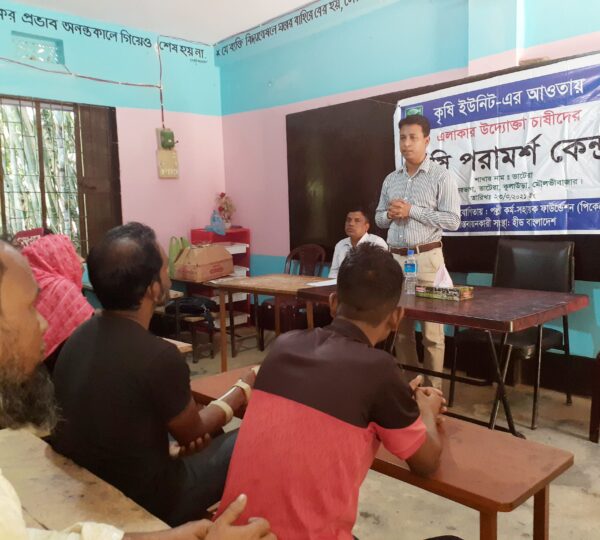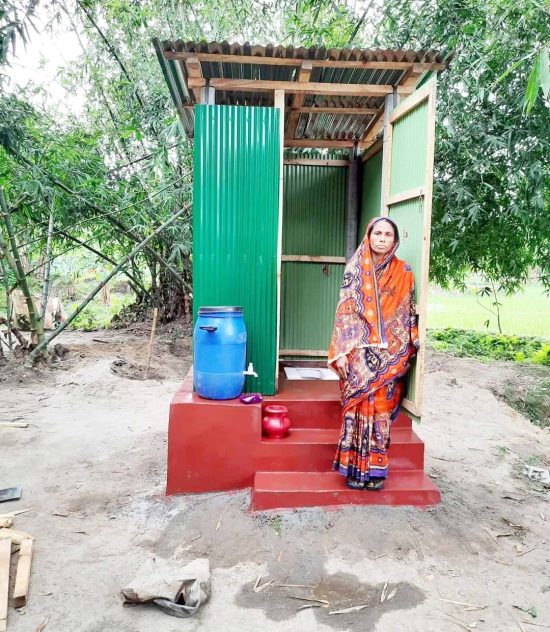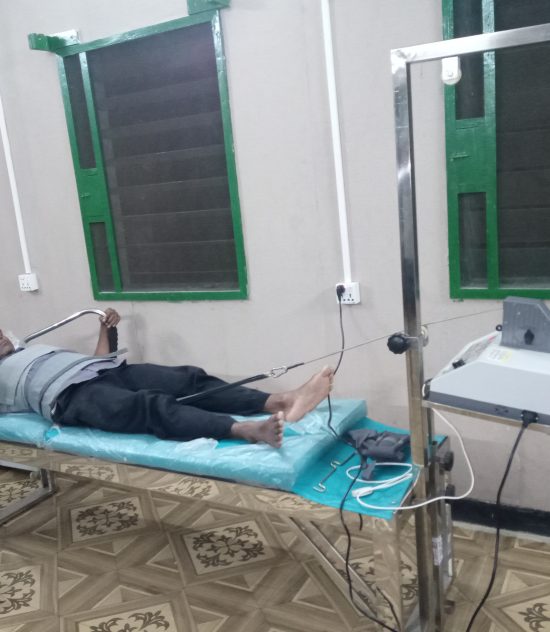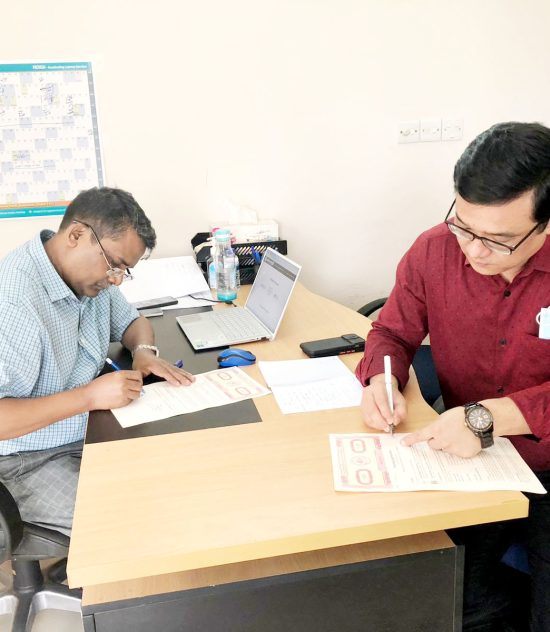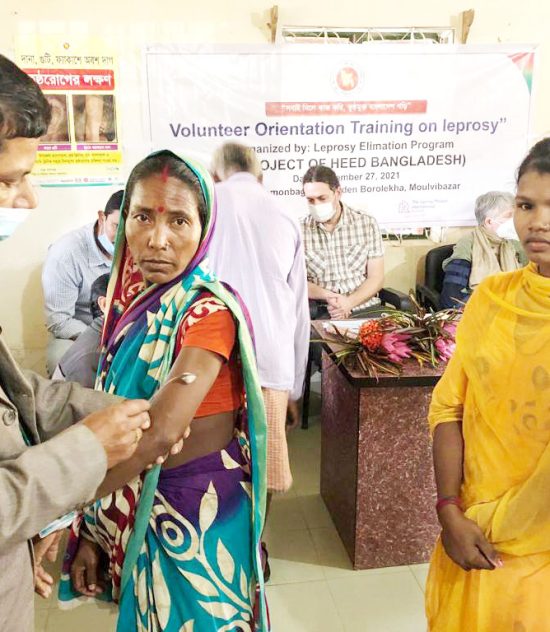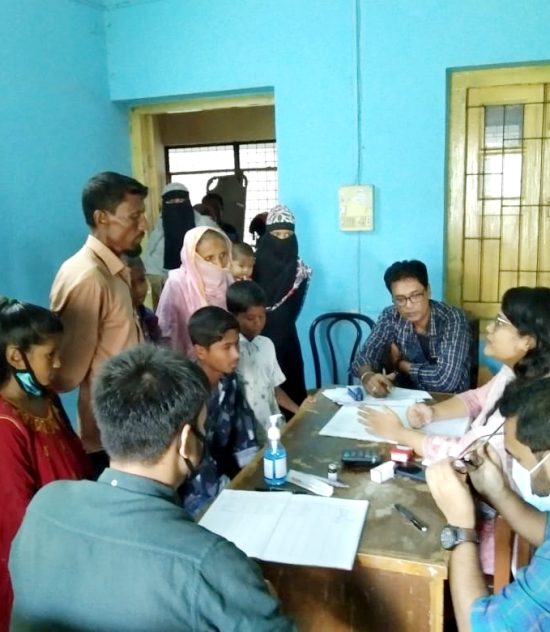Implemented by
Financial Support
Project Duration
Integrated Agriculture Unit (IAU)
Agriculture Program:
About the Project:
HEED Bangladesh is implementing the Integrated Agriculture Unit development program with the financial support from Palli Karma Sahayak Foundation (PKSF), an apex development organization of the Government of Bangladesh.
Relation with SDG Goal:
Integrated Agriculture Unit relates to the Sustainable Development Goals (SDGs) of the United Nations, Goal number 02-Zero Hunger. This SDG goal’s main target is to end hunger, achieve security, improve nutrition and promote sustainable agriculture. The main objectives of the project is to create sustainable technology dissemination, new Income Generation Activity (IGA) creation and increased family income on agricultural sector among beneficiary level through accelerating organization’s microcredit program and contribution to the national economy.
Project Duration:
This is an ongoing program since August 2015.
Geographical Coverage:
HEED Bangladesh is implementing the project under Moulvibazar district in Kulaura and Kamalganj upazilas through five its branches operating at Kulaura, Vatera, Adampur, Kamalganj and Munshibazar where HEED Agriculture unit extends coverage to 21 unions and among 199 beneficiaries.
Description of Project Activity:
• Skill Development Training and Making Farmers aware of using Technology in Crop Production.
• New agro-technology transfer and establishment of demonstration plots, i.e., Hybrid vegetable, High Yielding Variety (HYV) rice, summer water melon, summer tomato, chuijhal (piper chaba), safe vegetable farm.
• Orchard development and tricho-compost fertilizer production.
• Agricultural counseling center and Field Day at demonstration site.
• Distribution of 500 (five Hundred) Pheromone Lure at Farmers’ field.
• Establishment of safe Vegetable Sales Centre.
• Technical support to different farmers.
• Planning meetings.
Last year’s Achievements Demonstration:
The Agriculture unit has successfully achieved Implementing 99 Demonstrations using new technology in the Financial Year 2021-2022. After implementing the Demonstration, Beneficiaries are now cultivating crops throughout the year and are able to earn an additional income from the demonstration. Demonstration information are given below:

Last year’s Achievement of Training:
The Agriculture Unit has been able to successfully complete 04 batches of Skill Development Training in the Financial Year 2021-2022 by ensuring participation of 100 beneficiaries. Through skill development training, farmers are able to increase the production of agricultural crops by using the technological knowledge and as a result the family income has increased significantly.

Technology Based Inputs Distribution:
The Technology based tools have been distributed among the farmers. Farmers have benefited a lot from using technology based tools. The inputs are given below:

Last Year’s Achievement of Others Activities:

Lessons Learned by Implementing the Project Activities:
Remarkable event:
Good Agricultural Practices:
Success Story 01: Archana Rani Das
Archana Rani Das, Husband: Pintu Das, Village: Begmanpur, Union: Rauthgaon, Upazila: Kulaura, District: Moulvibazar. Archana Rani Das, a poor woman is a member of “Hakaluki Mahila Samity” under the village of Begmanpur of Rauthgaon Union of Kulaura upazila under Moulvibazar District. She has two sons and one daughter along with her husband. Her Husband is a poor farmer in the village and his own land area is 38 decimals including the homestead. It is very difficult to run their family with her husband’s income. They couldn’t run their family properly and send the children to school. There was no one to help her in this difficult time. Archana Rani was always depressed and thought how to increase the income of the family and how to get rid of poverty. One day, through a discussion with the chairperson of a Mahila Samity run by the HEED Bangladesh at a neighboring village, she learned the details of the rules and regulations of the Samity. After discussing with her husband at home, she decided to join the Samity. She aspired to build a better future in 2015, enrolled herself in “Hakaluki Mahila Samity” run by HEED Bangladesh and shortly after admission she took at first a loan of 10000/- taka. She took the loan money and started cultivating paddy on her own land and paid regular installments and deposited savings. In this way, she took a loan of 20000/- taka and regularly paid off the loan and deposited the savings. Archana Rani Das’s husband always felt frustrated. To get rid of his frustration, she brought her husband to the HEED Bangladesh office one day and took a loan of 50000/- taka by negotiating with the officials. She heard about the project named Integrated Agriculture Unit (IAU) implemented by HEED Bangladesh. She communicated with the Agriculture Officer of HEED Bangladesh.
They encouraged the couple to cultivate improved varieties of rice. Throughout the discussions with agriculture Officer under the Integrated Agriculture Unit of HEED Bangladesh they decided to produce paddy, so IAU gave the couple a financial grant of 5000/- taka for rice cultivation. After receiving the grant, Archana Rani decided to take lease of some land besides her own land and she cultivated paddy as per the advice of the Agriculture Officer. Besides helping her husband in his work, she started growing vegetables in the homestead. Archana Rani faced financial hardship while running their project. Watching their need the Agriculture Officer recommended to the HEED Micro Finance Project (MFP) to provide them some extra loan. So they got LRL loan of 20000/- taka. With that money, according to the advice of the Agriculture Officer, they used fertilizers, better quality seeds and pesticides and spent 28000/- taka on 60 decimal of the land and sold a total of 62500/- taka of rice and earned 34500/-. Thanks to the Agriculture Officer for his technical Support.
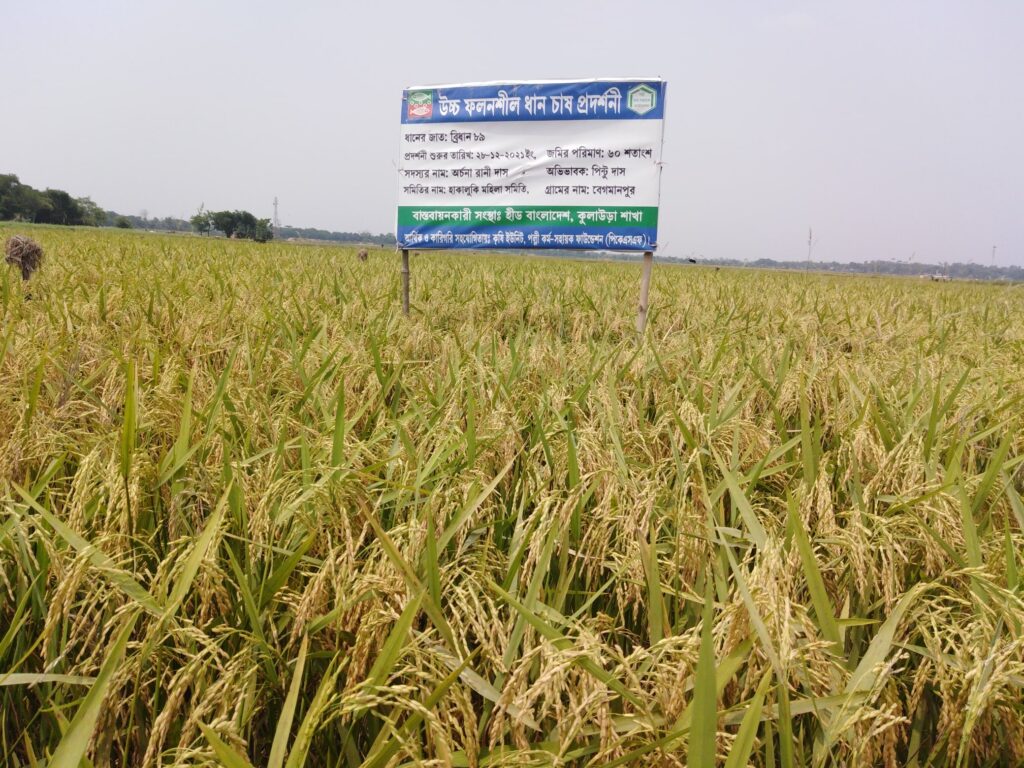
Now they can smoothly run their children’s education, they can meet up their household expenses and pay off their loan installments. Disappointment is over. They are eternally grateful to HEED Bangladesh for freeing them from the curse of poverty. Now they happily think about their wish of next new projects and dream about a better future.
Success Story 02: Changing Fortune by Virtue of Agriculture
Abdur Nur Hossain has proved that the wheel of life can be turned through agricultural work. He is the son of Abdul Jabbar of a native village named Baidyasasan of Tilagaon Union in Kulaura Upazila under Moulvibazar District. Poor farmer Md Abdur Noor Hossain happily said that, “HEED Bangladesh has changed my fortune and many poor farmers like me”. There are seven members in the family including his aged parents. So he has to manage a big family with his very little income. Due to scarcity of proper agricultural materials, lack of irrigation facility the harvest is low. One day Md Abdur Noor Hossain visited the local office of HEED Bangladesh to know about the activities of Surjo Shikha Purush Samity and he came to know that a project named Affiliated Agriculture Unit was run with the funding of Palli Karma-Sahayak Foundation (PKSF) & with the aid of HEED Bangladesh. He came to know about different crop production training, material support, financial support, different techniques etc. facilities from the Loan Officer and the Agriculture Officer. In 2022 he got admitted in Surjo Shikha Purush Samity. Later he took a loan of taka 20,000/- as per the rules of the Samity and paid regular savings. He used that money in cultivation of different types of crops, at the same time he ran a small business and also took technical advices from HEED Bangladesh.
In 2022, HEED Bangladesh selected him for summer watermelon cultivation training because of his interest and the nature of the land of Md Abdur Noor Hossain. He then took that training and started cultivating the Blackberry watermelons on his land. He and his wife worked very hard on the land and did proper task such as preparing the land, controlling weeds, sowing seeds, applying organic & chemical fertilizers, making bamboo lofts, irrigation, using pesticides, bagging of each watermelon etc. The Agriculture Officer of HEED Bangladesh always visited his exhibit and gave him proper advice. Md Abdur Noor Hossain received a grant of taka 15,000/- for the cultivation and it cost him approximately taka 32,000 including the grant.
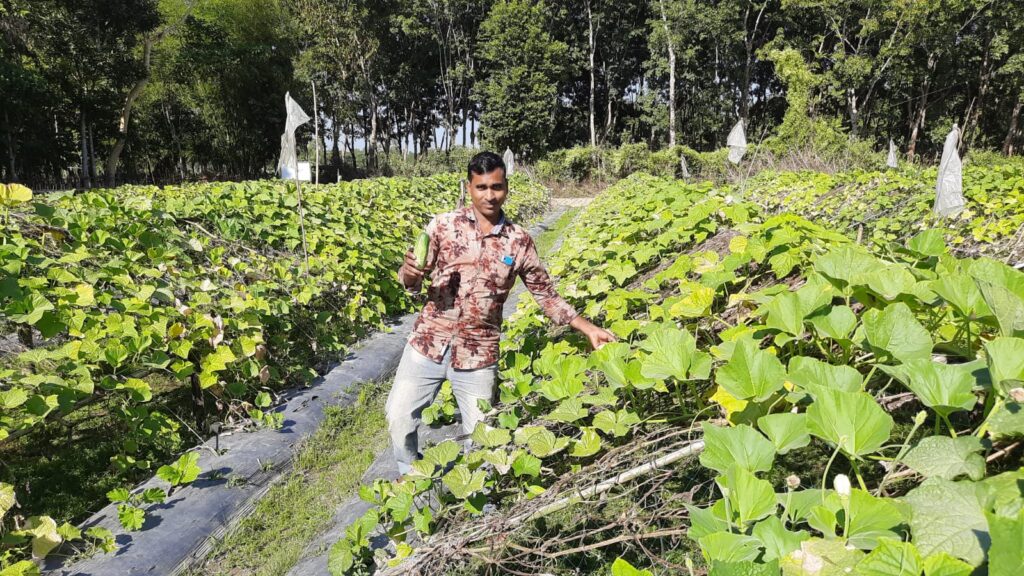
After a few days he was surprised to see the yield of watermelons. After only 75 days, he extracted 1550 watermelons from the land; each one of average weight of about 2.5 to 3 kg. He earned taka 112,000/- by selling those watermelons and made a net profit of taka 80,000/-. He said that in the future, he will plant watermelon on this land again and will use the previous bamboo loft so that his expenses can be much lower. Seeing Md Abdur Noor Hossain’s galore production of watermelon, many neighboring farmers have started the cultivation.
Once it was very difficult to maintain his family with his limited income, but now he is able to manage his family well and provide good food, medical care and education to his children. He has already bought a heifer, 2 goats and mortgaged 30 percent of the cultivated land with the money from the sale of watermelons. He said very complacently, “HEED Bangladesh gave me the opportunity to fulfill my dream. I hope that I will cultivate more widely in the future if I get the technical support of the Integrated Agriculture Unit of HEED Bangladesh”
Fisheries Program:
About the Project:
HEED Bangladesh is implementing the Integrated Agriculture Unit development program with the financial support from Palli Karma Sahayak Foundation (PKSF).
SDG and Integrated Agriculture Unit (Fisheries Part):
The goal and target of SDG 01 & 02 and Integrated Agriculture Unit –Fisheries parts are similar, like flip sides of the same coin. Main goal of SDG – 01 and SDG -02 is to end poverty and end hunger by all its forms everywhere, increase income, ensure nutrition and sufficient food. On the other hand, Integrated Farming Unit – Fisheries Sector’s main objectives and goals are to ensure use of technology, increase productivity, create market linkages, reduce poverty and thereby achieve sustainable food security.
Project Duration:
It is an ongoing program since August 2015.
Geographical Coverage:
HEED Bangladesh is implementing the project under Moulvibazar district in Kulaura and Kamalganj upazilas through five branches, namely, Kulaura, Vatera, Adampur, Kamalganj and Munshibazar where coverage is given to 21unions and among 582 beneficiaries.
Description of Project Activity:
- Training on fisheries.
- Technical support on different farming.
- Demonstration of different fish mixed culture; i.e., Carp – mola – tilapia – shing – magur – pabda – gulsha – chital – aire – bual – shol – pangas – koi, Carp Fattening etc.
- Establishment of safe fish sale Centre.
- High value tank fish/ bio flock fish culture.
- Ornamental fish culture and Nursery Pond establishment.
- Planning meeting.
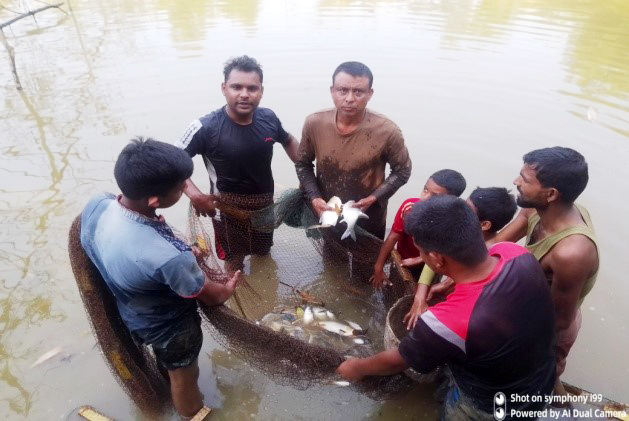
Last year’s Achievements Demonstration:

Last year’s Achievement of Training:

Last Year’s Achievement of Others Activities:

Last year’s Achievement of Demonstration and Training:

Lessons Learned By Implementing the Project Activities:
- Lack of Proper knowledge of stakeholders.
- Lack of irrigation in dry season and heavy rainfall in rainy season.
- Cluster basis demonstration is difficult due to selection criteria.
- Lack of established hatchery, i.e., for hatching of fish.
- Maximum number of ponds are seasonal, as a result there is difficulty on Demo establishment.
- Flash flood is a major problem.
- Dealer dependent market interfering development of asset.
Remarkable event:
Organized a Workshop on Market Linkage with Kulaura Upazila Government personnel for smooth operation of the Integrated Agriculture Unit.
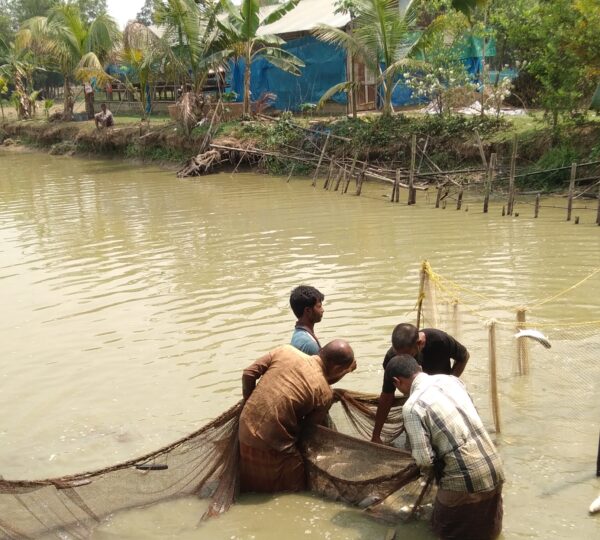
Case Study : Working life in a hundred adversities
The identity of Bengalis with fish and rice is very ancient. Bengali women brought fulfillment to this proverb. But if this woman is a successful entrepreneur in fish farming then it is surprising.
Implementation of HEED Bangladesh, in collaboration with the Kulaura Department of Fisheries and with funding from the Palli Karma Sahayak Foundation (PKSF), has provided encouragement to advance fisheries production and conservation. Rukia Begum is a woman entrepreneur of Prithimpasha village in Kulaura upazilla of Moulvibazar district.
After marriage, Rukia Begum started staying at her father’s house as her husband stayed in another district for work. However, in order to stay at her father’s house with self-esteem, she started pisciculture in 2020 by taking lease of 65 percent of the ponds from her father for fish farming. In the initial year, due to the lack of proper technical knowledge in fish farming, it was not possible to get the expected results by stocking fish fry in ponds in three ways. Then in the following year in 2021, she learned through the Loan Officer from HEED Bangladesh of Rangdhanu Mahila Samity of Prithimpasha village that the Palli Karma-Sahayak Foundation funded the integrated agriculture unit (fishery sector) with the help of Heed Bangladesh provided various technical advices and grants and necessary loans for fish farming.
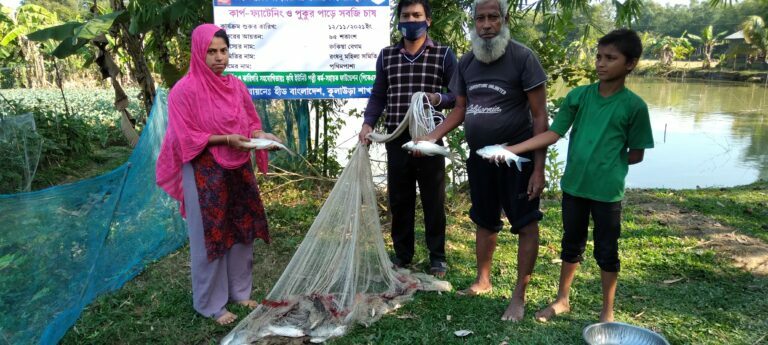
As soon as she knew that, she inclined to adopt the technique of demonstration of carp fattening with the advice of her husband and father. As the husband cannot be around all the time due to work, as a single parent, she took her father with her and engaged him in fishing. With a loan of taka 80,000/- from the HEED Bangladesh organization and with technical support from the Fisheries Officer, 65 percent of the ponds were stocked with a total of 590 pieces of 200-250 grams each of six species of fish and various vegetable plants such as, pumpkin, papaya were planted on the sides of the ponds for growing vegetables throughout the year. Among the 352 pieces of fish previously stocked in the pond, in addition to stocking 14 kg of fish from the budget grant by the organization, she stocked about 16 kg of fish with her own money according to the size of the pond according to technical instructions. As up to 12 November 2021, for the stock of fish fry in the pond, supplementary food was given regularly, three times daily, in morning-noon-afternoon. She did not use any kind of harmful medicine in her fish farming. After five months the fishes were partially harvested. Along with that, she sold about 60 kg of extracted fish in the first phase which was worth about 21,000/- taka at the then market price (60×350/-). Restock of fish equalled to the number of fish harvested. Rukia Begum said that she did not expect to get such good results in about five months. Rukia Begum expects to harvest 295-300 kg of fish as per the annual plan of one year. If she sells it at the lowest price in the current market @ Taka 350/- per KG, she can earn as much as Taka 1 (one) lac, she can also earn up to Taka 20,000/- by producing at least 250 kg of vegetables in 12 months from the vegetables planted in the pond. Because she got about 40 kg of pumpkin 20 days before the first round of fish collection, out of which she sold about 30 kg and earned an additional Taka 2,700/- in two months. She said that, if the weather is good then by regular cultivation she will be able to produce 200-250 kg of vegetables. In the future, she plans to expand the fish farm.
Figure of changes:

On the Way to Fulfilling Dreams Sanjida
Ornamental fish adorn the drawing room aquarium of rich people. At one time, this Ornamental fish was like a dream to people, but now it is found in district and upazila cities, some people have started commercial farming again. Ornamental fish have now started to be produced locally on a commercial basis. Sanjida Karmakar (28) of Momin Cherra village in Fenchuganj upazila of Sylhet district started Ornamental fish farming as a hobby.
Sanjida Karmakar is a tea garden worker and her husband Suman Karmakar is a rubber plantation worker. In addition to work, Sanjida Karmakar was associated with Akhi Mahila Samity of Vatera branch of Sylhet Area-02 of HEED Bangladesh. From there, she started small-scale Ornamental fish farming in four ditches under the fisheries sector of the Integrated Agriculture Unit in the Fiscal Year 2020-2021. Now her dream is to farm Ornamental fish commercially on a large scale.
The mother of a daughter, Sanjida said that initially she didn’t want to do Ornamental fish farming, but later as a hobby, she started farming with 102 species of Ornamental fish by making 4 ditches next to the house with 12,000/- taka of loan and her own 3,000/- taka, totaling 15,000/- taka.
She said that, 1300 Ornamental fish fry have been produced since the beginning. Out of this, 340 chicks were also sold. And she expects to earn 40-50 thousand taka from the rest of the chicks. Sanjida Karmakar said that, she will earn 50 to 60 thousand taka in a few months.
Now, she wants do it on a larger scale in the future. She also thanks HEED Bangladesh for giving her the opportunity to implement her dream and develop such a wonderful project.

Livestock Program:
About the Project
HEED Bangladesh is implementing the Integrated Agriculture Unit development program with the financial support from Palli Karma Sahayak Foundation (PKSF).
Relation with SDG Goal:
Integrated Agriculture Unit’s Livestock part is related with the SDG 01 and 02. The target of the SDG goal 01 is to end poverty in all its forms everywhere and SDG 02 is to end hunger and achieve food security. Integrated Agriculture Unit’s livestock part’s main target also aims to create new technology dissemination, increase productivity, ensure food security and nutrition and through this reduce poverty and end hunger.
Project Duration:
It’s an ongoing program since August 2015.
Geographical Coverage:
HEED Bangladesh is implementing the project under Moulvibazar district in Kulaura and Kamalganj upazilas through its five branches at Kulaura, Vatera, Adampur, Kamalganj and Munshibazar where coverage is extended to 21unions and among 582 beneficiaries.
Description of Project Activity:
- Training on livestock rearing & marinating bio security of the farm.
- High Yielding (Cow) breed development and demo establishment.
- Development of demonstration farm; i.e., Layer, Color Broiler, Turkey, Peking duck, Hilly Chicken and native chicken etc., in perch method.
- Establishment of Feed Processing Plant of Livestock at Vatera.
- Technical support on different farming.
- Planning meeting.
Last year’s Achievement of Demonstration:

Last year’s Achievement of Training:

Last year’s Achievement of Others Activities:

Last year’s Achievement of Demonstration and Training:

Lessons Learned by Implementing the Project Activities:
- Lack of Proper knowledge of stakeholders.
- Cluster basis demonstration is difficult due to selection criteria.
- Lack of established poultry hatchery.
- Unavailability of Vaccine.
- Dealer dependent market interfering development of asset.
- Organized a workshop on Planning and Coordination with Kulaura Upazila Government personnel for smooth operation of the Integrated Agriculture Unit.
- Organized a Workshop on Market Linkage with Kulaura Upazila Government personnel for smooth operation of the Integrated Agriculture Unit.
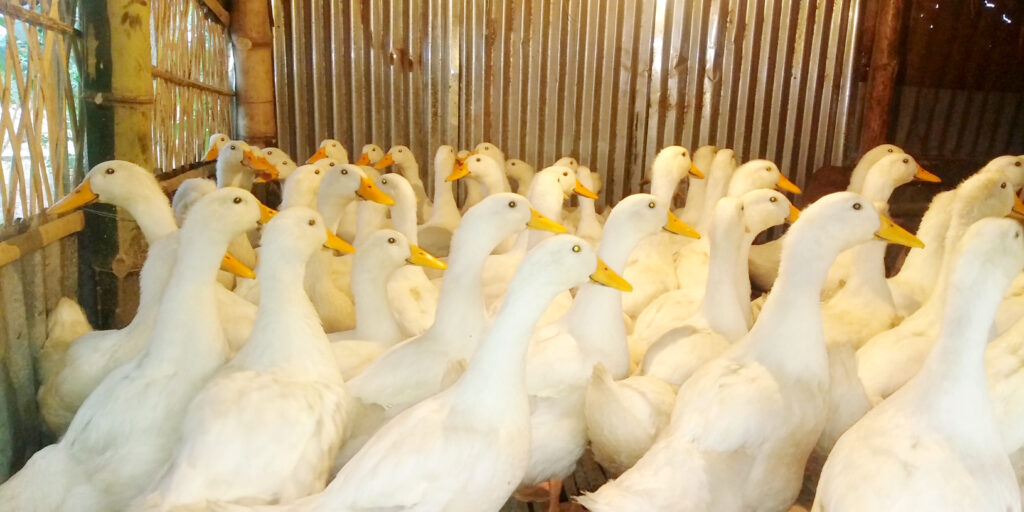
Case study: Kantama Rajbhar is now Self-Sufficient by Rearing Color Broiler Chickens
Kantama Rajbhar is from Longla tea garden in Kulaura upazila of Moulvibazar district. She is now the role model of her community. She has started to get the taste of success by rearing color broiler chickens. And besides her, other women in the tea garden area have also started to get motivated to raise chickens. But today’s success of Kantama did not happen overnight. She suffered a lot with her family. By working in the tea garden it became very difficult to support her family of five members. Moreover, she tried in many ways to manage her family with 3 little girls. But nothing was happening. Her husband Kalidas Rajbhar’s meager income was failing to support the family. After much thought, they decided to do something different. In fact, the residents of the tea garden cannot even think of doing anything different beyond their own boundaries. But it is Kantama Rajbhar’s will power that inspired her to think differently.
One day Kantama said to her husband, “Let us start a poultry business. Poultry business in the tea garden will be profitable.” Moreover, the market was not far from her house. Kantama continued to tell her husband, “We have 3 daughters. They can give time to us as well.” But her husband Kalidas Rajbhar said, “Poultry farming will bring profit, but I don’t have that much of money to raise a farm.” Their anxiety increased. After much thought, one day Kantama Rajbhar came to know about HEED Bangladesh. A concerned Officer explained everything to her smartly. Moreover, the Livestock Officer of HEED Bangladesh told her in details about the rearing of color broiler chickens. After understanding everything, Kantama Rajbhar joined Dipti Mahila Samity of HEED Bangladesh. After joining the samity she took a loan of about taka 35,000 taka. She bought about 220 colored broiler chickens with this money.
Kantama and her husband managed the farm very well. Their daughters also started spending a lot of time with them. Moreover, the Livestock Officer of HEED Bangladesh used to visit their farm regularly and give proper guidance. After 30-35 days they were surprised to see the condition of their farm. The chickens began to grow very quickly and beautifully. After 45 days, a chicken weighed about 1300 grams. They sold 220 chickens at taka 250/- per kg and earned taka 71,500/-.Their total cost is around taka 42,500/-.By rearing chickens for the first time, they earned a net profit of taka 29,000/- within a short time. They were very happy to see that.

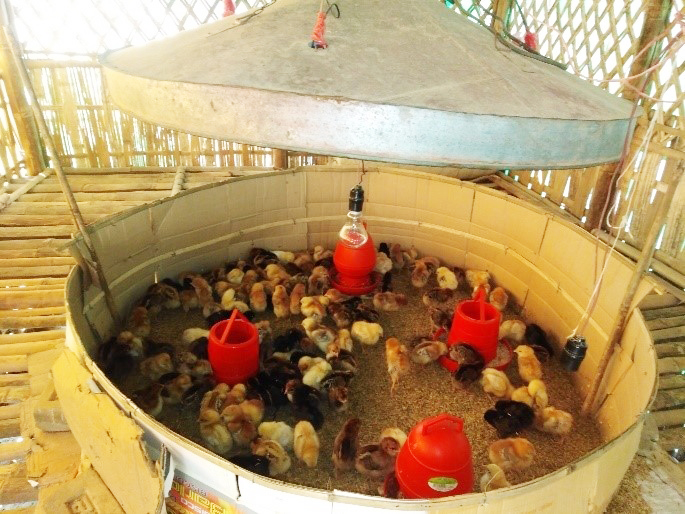
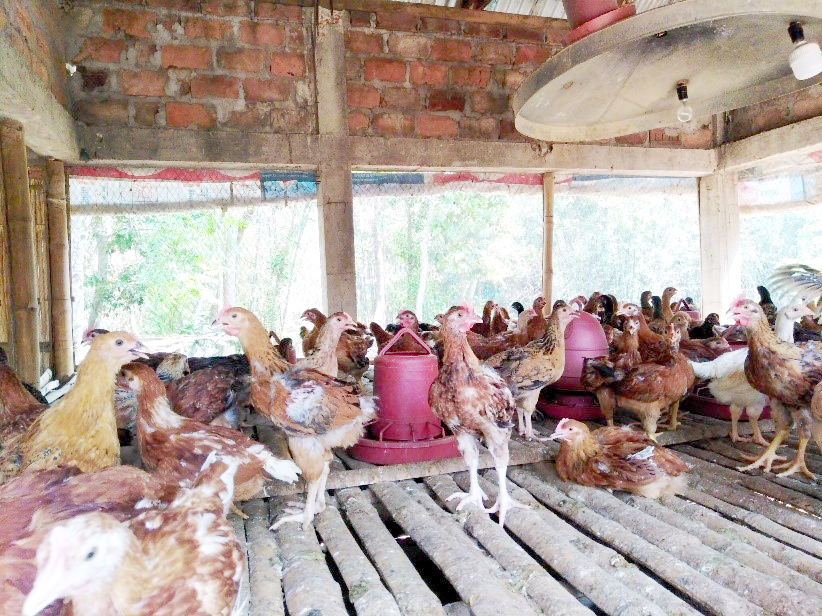
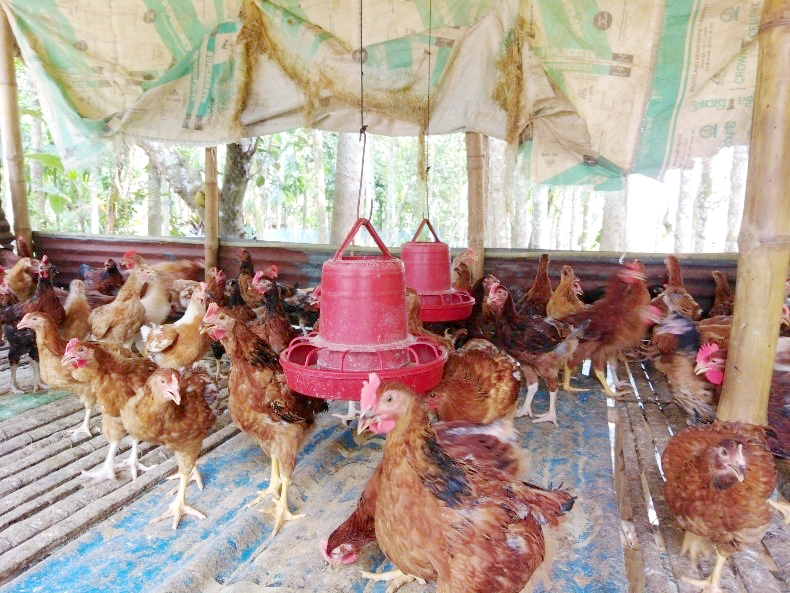
Kantama Rajbhar said, “The hardships for so long have been worthwhile today. I have been successful today after being plagued by poverty. The importance of HEED Bangladesh behind my success is immense. It would have been difficult for me to succeed without the proximity of HEED Bangladesh.” Both Kantama Rajbhar and her husband hope to expand their colored broiler farm. They said emphatically, “We want to take loan again from HEED Bangladesh and start a large scale farm”.
Seeing them, other women at the tea garden area are contacting HEED Bangladesh to take loans. Kantama Rajbhar is very much thankful to HEED.
The Success story of a Hard Working Rabeya Begum:
Rabeya Begum, a poor woman is a member of “Dishari Mohila Samity” under the village of Baidya Shason in Kulaura upazila of Moulvibazar District is now a successful layer farmer. At first she farmed a few layer chickens as a hobby but now this is her means of earning. In addition to farming, Rabeya Begum started a layer chicken farm next to her house on her own initiative in the hope of additional profit. Although she initially lost a lot by doing such a farm, she has now made a profit by dint of her hard working. For her activities, she has now become an example of success in her area.
Although Rabeya Begum has now made a good amount of profit from her farm, her success story was not that easy. She has six members in her family. They actually live from hand to mouth because of poverty. One day she came to know about the Integrated Agriculture Unit (Livestock) of HEED Bangladesh from her neighbor and from that moment she had never looked back. She got noticeable amount of assistance from HEED Bangladesh Microfinance team and because of that she showed her eagerness to raise a Layer Farm in her house. Before raising the farm she regularly joined group meetings which were organized by Integrated Agriculture Unit (Livestock) of HEED Bangladesh. She received plenty of suggestions and advice from the Livestock Officer and other Members of the Technical Support Team of HEED Bangladesh.
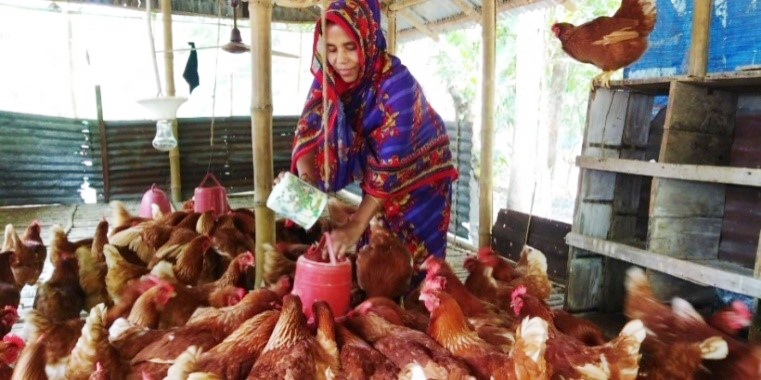

Rabeya Begum took loan of taka 95,000/- from HEED Bangladesh and bought all the necessary equipment that were needed to raise the poultry farm. She spent near about taka 90,000/- to raise this farm. She made a house of about 200 layer birds. The Livestock officer and Technical Support staff of HEED Bangladesh also gave her valuable advice to raise the farm. She then worked hard and spent a lot of time with the help of her husband Alkas Miah and other members of her family. During that time period she took part in all the meetings about farm management, feed management, light scheduling, vaccination program, Bio Security management which are arranged by HEED Bangladesh Integrated Agriculture Unit. After five months when the birds reached its production her joy knew no bounds. She was very happy then. Now she gets 170-180 eggs per day which she sells at the nearby market at 8 taka per egg and earns taka 1400/- per day. Thus she is earning 8000/-9000/- taka per month as a profit.
Rabeya Begum’s success story inspired many of her neighbors. Taking advice from her, many have approached Heed Bangladesh and expressed their interest to become self-reliant. Rabeya Begum herself did not forget to thank HEED Bangladesh. Her troubled days are now just a memory. She expressed her gratitude to Heed Bangladesh for her position today and also expressed that her relationship with this organization will continue in the future.
Good Practice:
- Farms are developed on perch method as a result, the deadly coccidiosis disease in poultry is under control.
- Awareness about poultry vaccine is achieved.
- Awareness towards maintaining hygienic measures is developed.
